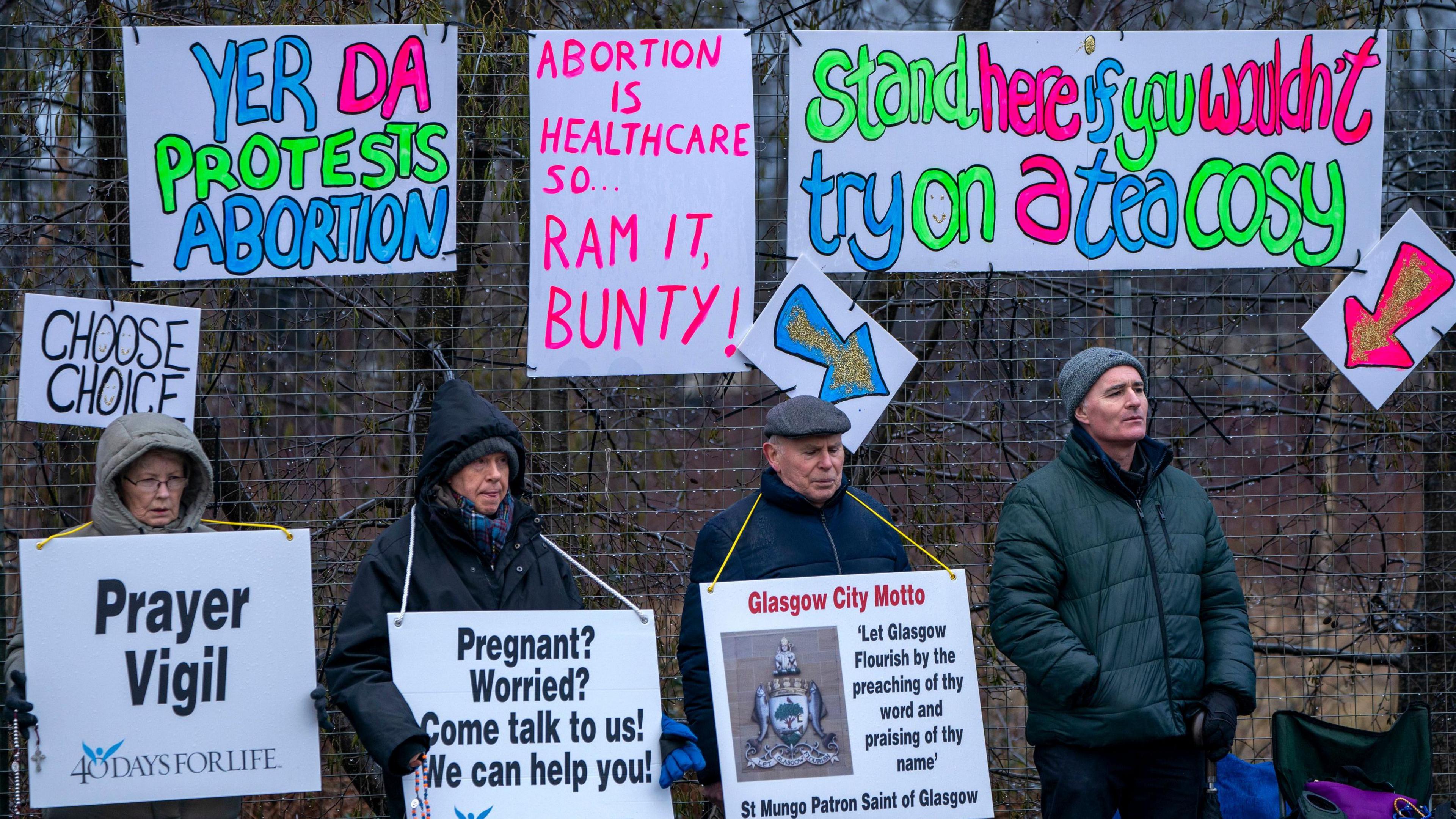Woman arrested at anti-abortion protest faces no further action
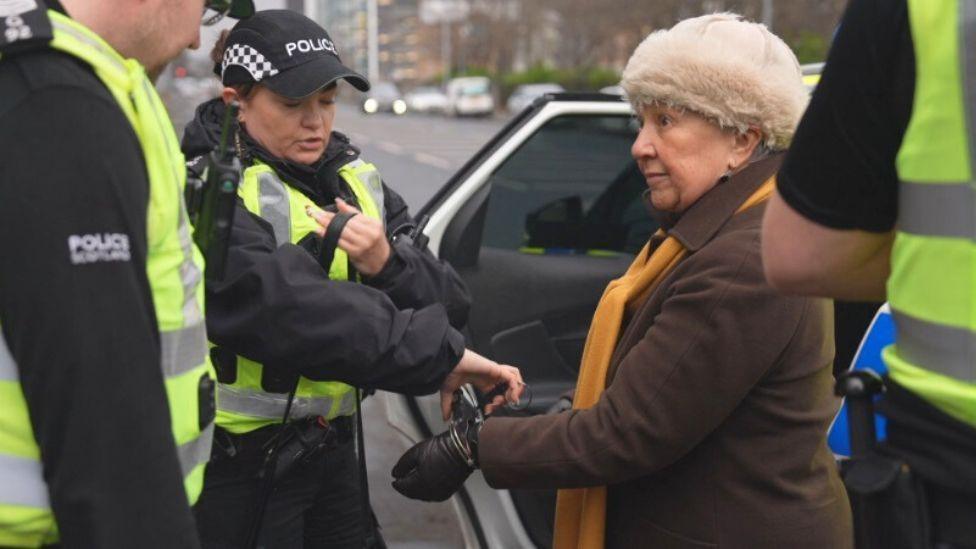
Rose Docherty was arrested near the Queen Elizabeth University Hospital in Glasgow in February
- Published
A woman who was arrested for taking part in an anti-abortion protest outside a hospital in Glasgow will face no further action.
Rose Docherty, 75, was the first person to be charged under a new law that created buffer zones outside Scottish abortion clinics.
She had been taking part in a demonstration close to the Queen Elizabeth University Hospital (QEUH) in February.
Ms Docherty had previously rejected a formal warning from the Crown Office, telling BBC Scotland News that it was "unjust".
The Abortion Services (Safe Access Zones) Act, which came into force last year, aims to stop the harassment of patients. Those who break the law could be fined up to £10,000 or an unlimited amount in more serious cases.
The Crown Office and Procurator Fiscal Service (COPFS) said it had carefully considered Ms Docherty's case and decided to take no further action.
She said she was "delighted" with the news, adding: "I feel it's a victory for common sense."
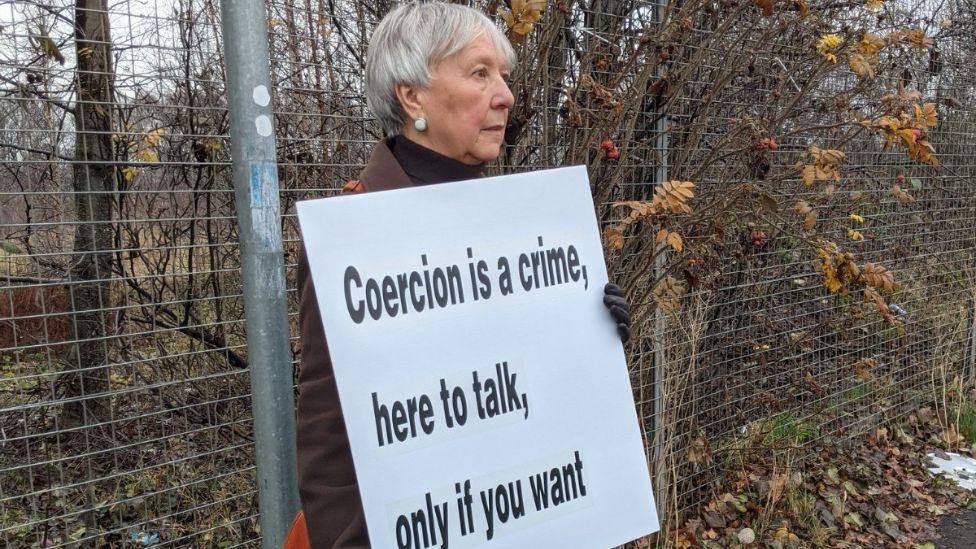
Rose Docherty was arrested under the new law in February
Doctors at the QEUH previously said that the protests, which have been held outside the hospital for nearly 10 years, were upsetting and intimidating for patients and staff.
At the February protest, Ms Docherty held up a sign that said "coercion is a crime, here to talk, only if you want".
Following her arrest, the Crown Office sent her a formal warning.
It said the procurator fiscal had decided against bringing Ms Docherty before a court and if she accepted the warning she would not be prosecuted.
But she refused to accept the warning as she believed it was "unjust".
"I just did what I thought was right," she told BBC Scotland News on Thursday.
"To be warned for having stood on the streets of Glasgow offering to have a conversation if anyone wants to come and speak to you - it just seems preposterous."
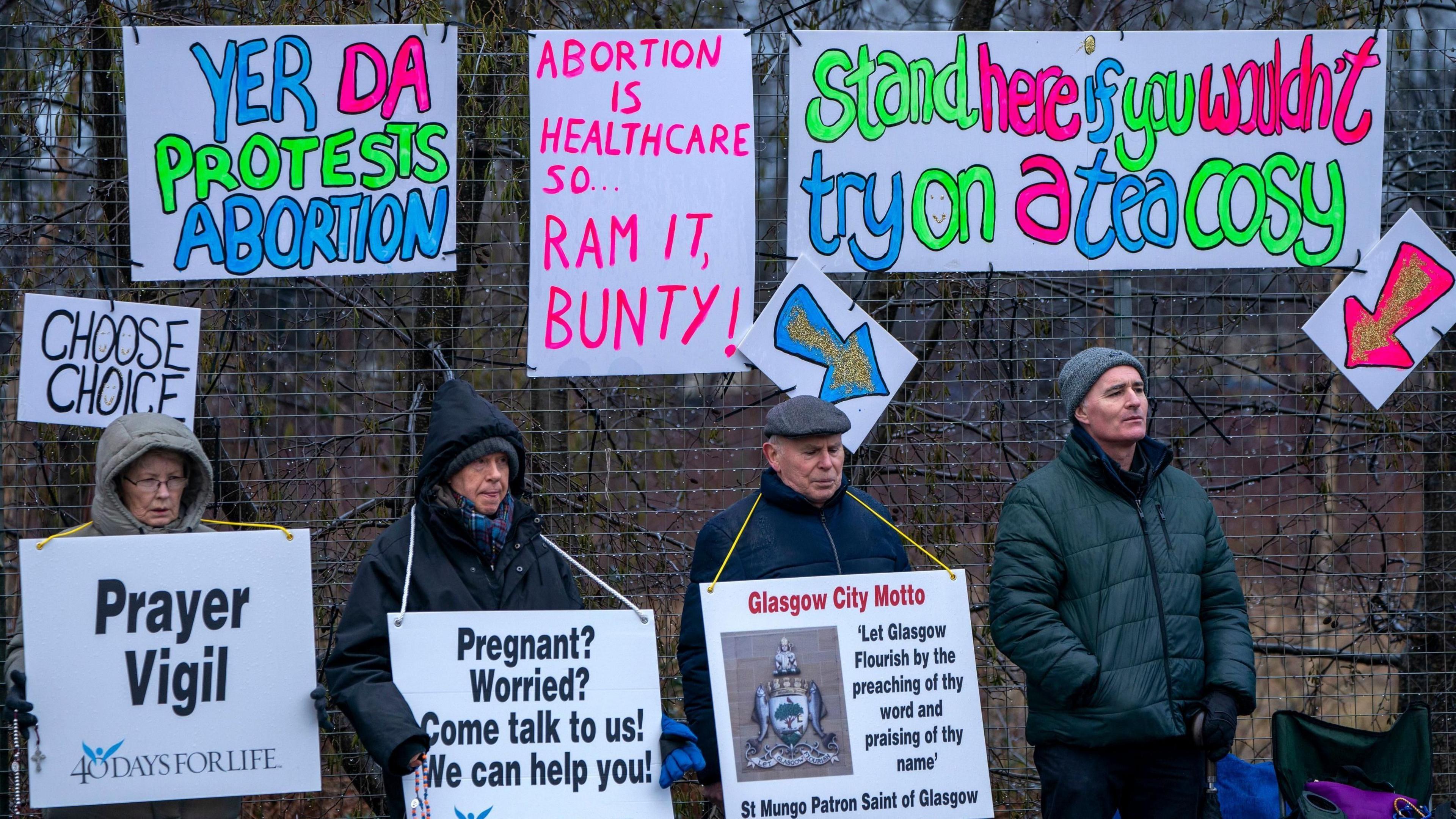
Previous protests outside abortion clinics prompted the Scottish Parliament to introduce buffer zones
She said there was "no need for the legislation in the first place" as police already have powers for dealing with intimidation and harassment.
Ms Docherty added: "The procurator fiscal has withdrawn that warning so that seems to indicate that I was not breaking the law.
"This buffer zone law is all about intimidation, harassment and influencing.
"There is nothing intimidatory or harassing about an elderly woman standing by the roadside offering to lend a listening ear."
When asked if she would return to hold a sign outside the hospital, she said: "Life moves on for people and I'll make decisions as and when I feel like I want to do something but I don't feel that I'm constrained by being afraid."
She previously told the BBC's Scotcast that she would have been prepared to go to prison over the incident.
A Crown Office spokesperson said: "Professional prosecutors from COPFS considered the report. All Scotland's prosecutors operate independently of political influence.
"After careful consideration of the facts and circumstances of the case, including the available admissible evidence, it was decided that there should be no further action taken at this time.
"The Crown reserves the right to take proceedings in relation to this incident in the future."
'Cruel and unkind'
Agnes Tolmie, chair of Scottish Women's Convention, said she hoped the incident would not encourage others to break the buffer zones law.
She said: "If this is being held up by this woman, Rose Docherty and her supporters, as some sort of champion of her rights and not seen as breaking the law, then our concern is that it gives a green light for others to protest within that safety zone.
"That was created to protect women and allow them to go and have an abortion or advice around abortion without interference.
"So hopefully that hasn't set off a green light for others to follow suit."
The abortion zones law, external was brought into force last September.
It was drawn up by Scottish Greens MSP Gillian Mackay, who said women seeking the procedure were subjected to "totally unacceptable abuse and obstruction" outside hospitals.
Within the buffer zones, it is a criminal offence to behave in a way that could influence the decisions of women and staff to access services.
Stopping women and staff from entering the clinics or otherwise causing alarm, harassment or distress is also an offence.
The law prevents any protests or vigils from taking place within 200m (650ft) of 30 clinics around the country.
Dr Greg Irwin, a doctor at the QEUH, was pictured confronting a group of protesters in February 2023.
At the time, he said that the anti-abortion activists were "bullying" women trying to access healthcare and "upsetting" staff at the hospital.
Dr Irwin described the protests as "an unbelievably cruel and unkind thing to do".
US Vice-President JD Vance, who is currently visiting Scotland on a family holiday, criticised the buffer zones earlier this year.
He used the law as an example of Europe not protecting free speech enough and claimed people who live within safe access zones had been sent letters by the Scottish government warning them about praying within their homes.
A Scottish government spokesperson said it had not sent such letters, and that only "intentional or reckless behaviour" was covered by the act.
Related topics
- Published15 May
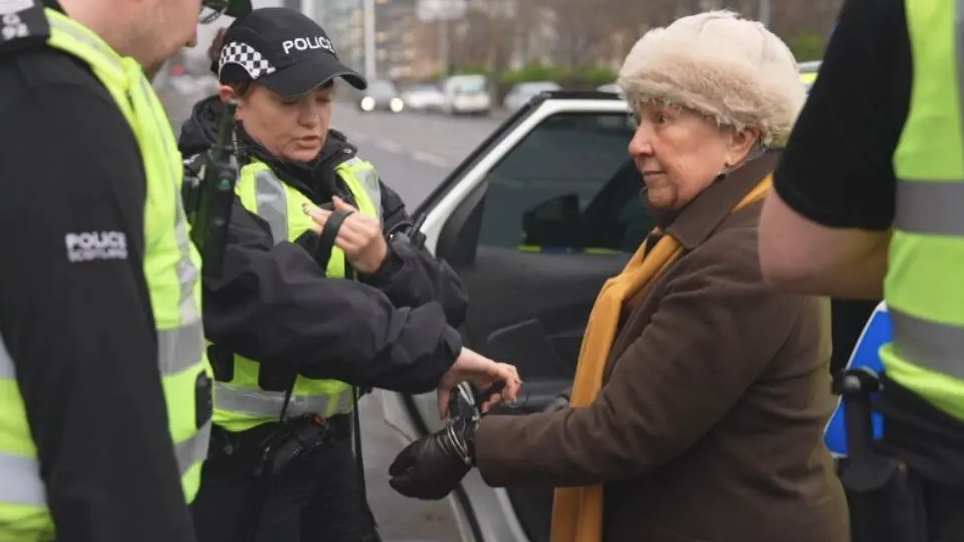
- Published24 February 2023
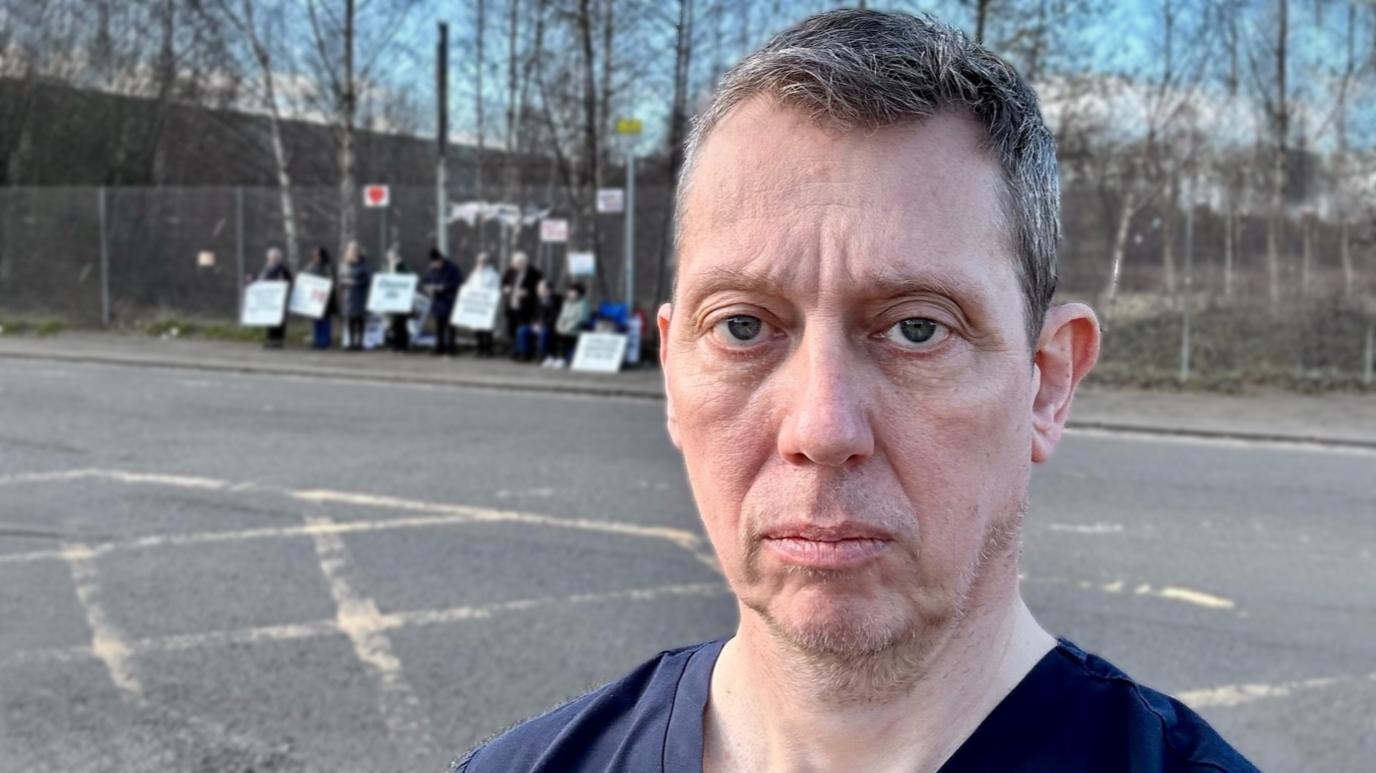
- Published24 September 2024
